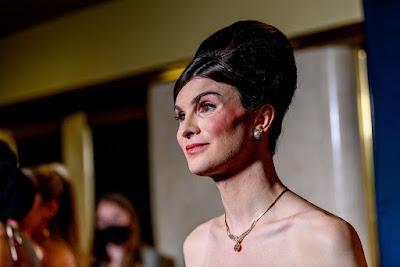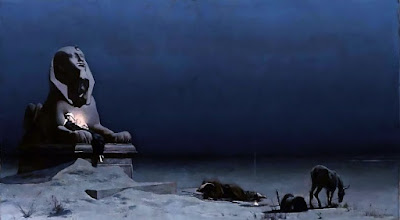Attending a large R1 research institution as an undergrad, I was surrounded by engineers. My parents were math teachers. My brothers are engineers. My roommate was an engineer. We hate what we don't understand, and for the life of me I couldn't understand or relate to the left brain and so loathed it on campus. For a quick general breakdown, those who are predominately left or right brain might be characterized by the following:
Left Brain:
- Logical
- Focused on facts
- Realism predominates
- Planned and orderly
- Math-and-science minded
Right Brain:
- Emotional
- Focused on art and creativity
- Imagination predominates
- Occasionally absentminded
- Enjoys creative storytelling
The thing is, when I became Catholic my freshman year and joined the Newman center, obviously there were a mix of these "logical, fact-focused, math & science planned and orderly realists" among people of faith in the Catholic community. And of course there are degrees of both hemispheres in individual people.
As a predominately right-brained person, I feel a little self-conscious in a more traditional community because of the way I am. But I have grown to appreciate the order and predictability of the Old Mass, and have no tolerance for liturgical "creativity" that I experienced in the Novus Ordo. I find liturgical dance, spoken word, improvisation and such things cringe worthy. I never felt at home in the Charismatic movement, or Praise & Worship type services.
I'm in a strange period now where I am leaning on the order and predictability of the ritual and assent to faith while grinding through a creative and imaginative dry spell--in writing, in my worship and prayer life, and just my life in general. And thank God it's there. I don't get off on it the way left-brain Catholics who geek out on liturgical nuances or theological tit-for-tats might, but I appreciate it. I may be checking the boxes, but I'm ok with that for now.
Albert Einstein once said, “The intuitive mind is a sacred gift, and the rational mind is a faithful servant. We have created a world that honors the servant, but has forgotten the gift.” I find this to be true in what the world values.
In the movie "Romero," the Archbishop is invited to the home of a well-to-do couple. Pleasantries are exchanged, and then the businessman husband/father lays into Archbishop Romero in the kitchen:
"You religious people ...You live in your souls. You do not understand what we do ...producing, selling, bringing dollars in...Capital, to develop the country, to create jobs ...to build a prosperous economy. That is what affects people. But for that we must have law and order."
Succeeding in the world is a wholly pragmatic affair, one I never really caught on to, as I'm sometimes reminded. I never did any internships, got a useless degree, for ten years I thought I would be a monk, I never made much money and never really cared, don't have much to show for a career. But I've always prayed, and I know God is faithful. I know it is not a futile endeavor...but that itself takes faith.
My primary sins, as a right-brained creative/imaginative type, often comes by way of impulse--if I fall, I fall hard but don the sack cloth and ashes in tears as well. I live in my heart, not my head. This is why I love the King Davids over the King Sauls, and the Peters over the Thomas.' Were I to be tempted by apostasy, I think it would be at the hand of hurt, rather than issues of belief or doctrine.
Although it is only speculation (since I have a hard time understanding them), I wonder if the sins of the left-brained type people differ in nature. What are there primary temptations? Do they struggle with reason? With Pharisaism? With the 'sins of certainty?'--of thinking that "if i just do x, God will do y"? Of the logical progression of right belief+right worship=sanctity? I don't know! I want to ask them!
In the early centuries of the Church, most of there heresies revolved around the nature of Christ. Adoptionism, Docetism, Apollinarianism, Arianism, Monophysitism among others wrestled with how GOD could become MAN and possess two distinct natures, which are united but not combined.
Christ as perfect man had a distinct sex (male) but embodied the totality of human nature as well: he wept, he longed to gather his people as a hen gathers her chicks, he expressed tenderness and empathy. He sought to short-circuit the law-minded ways of thinking (by his teaching, by parables, by his witness in washing feet and healing on the Sabbath) to raise the disciples' heads to the work of grace.
St. Paul for his part was a radical zealot of the law who became the Apostle of grace. Grace is messy! Not always neat and orderly! Paul's road to Damascus moment was a blinding subjective encounter with Christ which literally knocked him from his (high?) horse. The law counts for nothing, according to Paul.
And yet for Traditionalists, there is comfort in the spiritual equations: if I say A, I merit B. If I practice X, my children will grow up Y. If I believe and check the right boxes, I can rest assured in certainty that God will not abandon me. Perhaps this is the 'sin of certainty' that leaves no room for the creative action of God to actualize our reality in a way that doesn't make logical sense. You see the antithesis to this line of reasoning in the life of David in 2 Sam 12:21-23:
His attendants asked him, “Why are you acting this way? While the child was alive, you fasted and wept, but now that the child is dead, you get up and eat!”
He answered, “While the child was still alive, I fasted and wept. I thought, ‘Who knows? The Lord may be gracious to me and let the child live.’ But now that he is dead, why should I go on fasting? Can I bring him back again? I will go to him, but he will not return to me.”
But sometimes God does leave us alone, withdrawing from us and leaving us to the mystical 'dark night,' which for the left-brained can (I imagine) be a bit of a disconcerting place to be. In the same way I have no affinity and cannot understand St. Thomas Aquinas as a right-brained creative, a left-brained believer may struggle to relate to the boundary breaking ecstasies of the St. John of the Cross's and St. Teresa of Avilas.
I think for right-brained, creative types, it is good to learn and establish order and right worship from the beginning to learn how to 'color within the lines.' If you look at Pablo Picasso's early work, he was a realist--it was only later, after learning the rules and form of art, that he began to branch out into more experimental work.
I think it can be difficult for left-brained people, though, to do the same with their 'weaker arm.' That is, perhaps in the life of faith, practicing more contemplative ways of praying or just "being" with God in adoration rather than always "doing." Or journaling or something, to discover how God is speaking to them. I don't know. I'm not one of these people. But I think it's healthy to work on the things that don't come to us as part of our natural disposition.
For myself, I struggle with the sin of envy in my self-consciousness--that I invested all my capital in a spiritual economy, rather than a practical one, and so I'm behind the curve in my career. And so I envy those left-brainers who the world values and pays accordingly, who can provide well for their families as lawyers or engineers or scientists or accountants or whatever. And so it comes out in anger and envy, because I feel dumb, broke, emotional, exposed, and impractical (though this is highly exaggerated in my mind). As a result, I hate the way God made me--to be feeling, intuitive, creative, etc. These are "bad" things. I judge others, and I judge myself, and harshly so. This is my sin (among others).
But this is how God made me. I try hard to rest in that. It can be hard to accept yourself, and just let yourself be loved sometimes, the way you are. God didn't make me with a logical brain. He didn't make me a planner or a reasoner. But I'm not a reject, a 2nd quality fruit; I have to trust that. Although I haven't had a good cry in years, I always welcome it when it comes. If anything, I may even have a degree of buoyancy and elasticity to take the unexpected things God throws us and not be broken by them. Maybe it is my term insurance against apostasy. Faith and reason, works and grace, the human and divine nature of Christ--there is always this tension in the life of faith, and sometimes one is prioritized and weighted more above the other. But we have two hemispheres of the brain for a reason, even if one tends to dominate. It's what makes us humans, not pre-programmed cyborgs.



.jpg)













.jpg)

.jpg)





